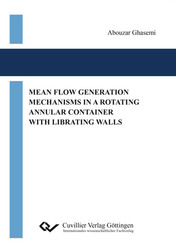| Fachbereiche | |
|---|---|
| Buchreihen (96) |
1381
|
| Nachhaltigkeit |
3
|
| Gesundheitswesen |
1
|
| Geisteswissenschaften |
2370
|
| Naturwissenschaften |
5408
|
| Mathematik | 229 |
| Informatik | 319 |
| Physik | 980 |
| Chemie | 1364 |
| Geowissenschaften | 131 |
| Humanmedizin | 243 |
| Zahn-, Mund- und Kieferheilkunde | 10 |
| Veterinärmedizin | 108 |
| Pharmazie | 147 |
| Biologie | 835 |
| Biochemie, Molekularbiologie, Gentechnologie | 121 |
| Biophysik | 25 |
| Ernährungs- und Haushaltswissenschaften | 45 |
| Land- und Agrarwissenschaften | 1005 |
| Forstwissenschaften | 201 |
| Gartenbauwissenschaft | 20 |
| Umweltforschung, Ökologie und Landespflege | 148 |
| Ingenieurwissenschaften |
1795
|
| Allgemein |
98
|
|
Leitlinien Unfallchirurgie
5. Auflage bestellen |
|
Erweiterte Suche
Mean Flow Generation Mechanisms in a Rotating Annular Container with Librating Walls
Abouzar Ghasemi (Autor)Vorschau
Inhaltsverzeichnis, PDF (69 KB)
Leseprobe, PDF (170 KB)
The current work aims to contribute to our understanding of mean flow generation mechanisms in rotating fluids. The focus is on the mean flow generation mechanisms by: 1) centrifugally unstable Görtler vortices and 2) resonant excitation of inertial waves in a stable regime. Direct numerical simulations (DNS) of the fluid flow in a rotating annular container with longitudinally librating walls are used to investigate the mechanisms.
Longitudinal libration of the cylinder side walls of an annulus induces in a supercritical regime an unstable Stokes boundary layer which generates Görtler vortices in a portion of a libration cycle, as a discrete event. DNS results show that these vortices propagate into the fluid bulk and generate an azimuthal mean flow. Reynolds-averaged Navier–Stokes (RANS) equations are used as a diagnostic tool to investigate generation mechanism of the azimuthal mean flow in the bulk. First, we explain, phenomenologically, how absolute angular momentum of the bulk flow is mixed and changed due to propagation of the Görtler vortices, causing a new vortex of basin scale size. Then we investigate the RANS equations for an intermediate time scale of the development of the Görtler vortices, and for a long time scale of the order of several libration periods. The former exhibits sign selection of the azimuthal mean flow. Investigating the latter, we predict that the azimuthal mean flow is proportional to the libration amplitude squared and to the inverse square root of the Ekman number and libration frequency. We confirm this using the numerical data. Additionally, presence of an upscale cascade of energy is shown, using kinetic energy budget of fluctuating flow.
In the second part of the current study, we investigate the mean flow generation mechanism by intrinsic nonlinearity of the inertial wave beams and normal modes in a rotating annular cavity with longitudinally librating top and bottom lids in a stable regime. We confirm the generation of progressive inertial waves as localized shear layer and normal modes as standing waves at and close to the resonance frequencies. We focus on the low order inertial normal modes. Using the DNS results, we show that when the low order normal modes are excited, a non-geostrophic azimuthal mean flow is generated in the bulk. Following Tilgner (2007) and using analytical and DNS solutions, we identify the source terms responsible for generation of the azimuthal mean flow. We show that helical property of the inertial waves and normal modes causes the source terms. Using the analytical solution, we separate the inertial wave beams from the DNS solution. We show that at and close to the resonance frequency, libration phase of the normal modes is always following that of the inertial wave beam, and their phase lag depends on the libration frequency. Analogy to classical mechanics is commented. Generation efficiency of the mean flow is discussed with respect to the phase lag. Additionally, we address wave-wave and wave-boundary layer interactions, and dependency of the mean flow on the dimensionless parameters.
We show that the results obtained are valid for small inclination of the inner cylinder side wall.
| ISBN-13 (Printausgabe) | 9783736993686 |
| ISBN-13 (E-Book) | 9783736983687 |
| Buchendformat | A5 |
| Sprache | Englisch |
| Seitenanzahl | 140 |
| Umschlagkaschierung | glänzend |
| Auflage | 1. Aufl. |
| Erscheinungsort | Göttingen |
| Promotionsort | Cottbus |
| Erscheinungsdatum | 15.03.2017 |
| Allgemeine Einordnung | Dissertation |
| Fachbereiche |
Naturwissenschaften
|
| Schlagwörter | mean flow generation mechanism, rotating fluids, direct numerical simulations (DNS), Reynolds-averaged Navier-Stokes (RANS) |








